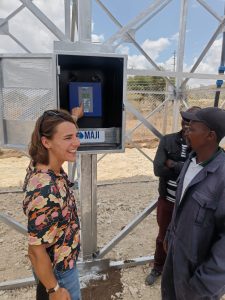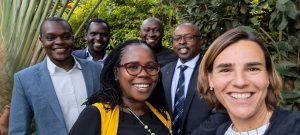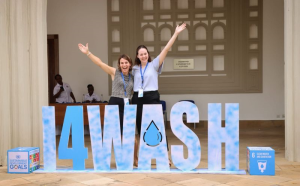25 July 2023
Aqua for All’s East Africa Regional Manager, Marlies Batterink, brings almost two decades of expertise to the water sector. For ten years at Aqua for All, Marlies has been the driving force ensuring stakeholder collaboration and successful scaling of sustainable water and sanitation solutions for low-income communities in East Africa.
Before starting a six-month sabbatical, we talked to her about her experience and her insights on transforming the water and sanitation sector.
Can you tell us a bit more about yourself and what led you to work in the water sector?
Since I was a child, I have always been curious about the world. I therefore studied International Land and Water Management at Wageningen University and got to learn more about the sector.
My first job was at the Netherlands Ministry of Agriculture, Nature, and Food Quality. Later, I joined Arcadis, a global consultancy company with a very dynamic environment and excellent experience in working in the water sector. However, my work focused on the Netherlands exclusively. I enjoyed both jobs, but after more than 10 years, I wanted to work in an international context and in the development space. That’s when I started at Aqua for All.
Why did you join Aqua for All?
I remember signing up to receive their newsletter, and one day, there was a job opening. My interview was with Dick Bouman and Aqua for All’s former director Sjef Ernes, who were very passionate about the sector. We talked about global challenges and international development, and I discovered a totally different professional environment that I wanted to join. I was very happy when I heard I was selected for the job as 3R (Recharge, Retention and Reuse) Manager. When I joined in 2013, Aqua for All had a team of approximately ten people, all with a huge passion, drive and commitment.
 How has your role at Aqua for All evolved over the past ten years?
How has your role at Aqua for All evolved over the past ten years?
As 3R Manager, I mainly supported partners working on scaling small-scale water resource management interventions in various countries. I expanded my role into Business Development Manager for WASH, focusing on the Horn of Africa and East Africa, mainly Ethiopia, Tanzania, and Kenya. At that time, Aqua for All was growing and further professionalising. My experience at previous government jobs and the consultancy business was very useful in supporting that process. Aqua for All adopted a regional focus to better understand the local context, build sustainable relationships and adjust existing global solutions to the needs of the region. That is how I became Programme Manager for East Africa.
Have you always had an affinity for East Africa?
It was natural for me to focus on East Africa because I had lived there for some years and still have a personal connection with the region. I feel at home in Kenya. I am very pleased to be able to professionally contribute to the development of this part of the world.
Spending a lot of time in Kenya helps me and our organisation to better understand how things work. It helps me to create and sustain relations and partnerships and develop a deep understanding of the country and its systems.
Aqua for All recently launched the Challenge Fund for Kenyan water and sanitation enterprises. How was the idea born, and what makes it different from other financial partnerships?
The Challenge Fund was born out of previous experiences within the sector and extensive conversations, specifically with our colleague Joshua Kibet, Aqua for All’s WASH Finance Lead for East Africa and Ethiopia. After long work days and field visits, we often take time to reflect and discuss how to improve and create more impact. We identified small piped water systems as an area that requires attention, and allows Aqua for All to contribute from our specific role and expertise area.
Small-scale and community-based water service providers usually target lower-income communities in peri-urban, rural or remote areas. Actually, they provide services to the majority of the Kenyan population. Typically, they are not creditworthy because these community service providers can hardly access loans from commercial lenders without collateral or credit history. However, most of them have the ambition to improve or expand their services. Hence, we saw this as a gap and opportunity to pro-actively play a role.
Since early this year, the Challenge Fund aims to fill this gap. The fund was created from scratch. It took us almost two years to finalise the concept, find technical and financial partners and launch it. I am extremely proud of it – it brings together many innovative concepts and expertise areas – and I am looking forward to seeing its impact.
The fund offers technical assistance to water service providers to enable them to get access to services from local financial institutions, through revenue-based loans. The Challenge Fund has the potential to transform the water sector. By improving service delivery through partnerships and innovative technologies and approaches, it allows commercial finance to enter the sector, which is the way to go!

In your opinion, how has the WASH sector changed since you joined Aqua for All?
Back in 2013, there was a big push for sustainability. This push focussed mainly on sustaining the functionality of interventions and first steps towards viable revenue models.
In the past five to six years, the focus on and support towards the private sector in water and sanitation has grown significantly, as well as the efforts to involve private financiers to fill the investment gap in SDG 6. While the focus on sustainability remains, the strategies and stakeholders to get there have changed.
Aqua for All right now addresses a business and finance perspective as part of our approach towards sustainability. It is essential to balance social, technical, environmental, business, and financial aspects in the Water and Sanitation space. Combining these expertise areas in our work is what makes Aqua for All’s approach so unique and, I believe, very impactful.
Why is it important to develop the WASH service delivery market and mobilise private capital for WASH simultaneously?
Working with both components within one organisation is unique and essential for working towards sustainable interventions. We combine different expertise areas that strengthen and inspire each other and allow us to assess interventions from different angles. Focusing on both of these components gives more credibility to the solutions we support.
Embedding this approach into our strategy and capacities enables us to better develop and support integrated programmes, which is key to creating a sustainable WASH system.
What role do you see for public and private stakeholders in this process?
Public and private stakeholders need to align their approaches better. The public sector should take a leading role in setting the roadmap for what is needed and where. This also allows government budgets and the limited grants available to go to where they are really needed.
Currently, I notice that the different development sectors or even stakeholders within the WASH sector work in silos which slows down the achievement of the SDGs. Close collaboration and joint programmes targeting different needs should be encouraged – and need to be coordinated. I would like to see sector stakeholders and programmes celebrating joint successes instead of chasing individual triumphs.
To end on an inspirational note, what do you love most about your work, and what achievement are you the most proud of?
Since my first day, I realised Aqua for All acts at the forefront of innovation in the sector in a flexible, impact-driven way. Our unique position is possible because of the continued support of the Dutch government.
I am proud of many things we did and do, but lately, I am really proud of the impact we were able to create even during the COVID-19 pandemic. In spite of the many limitations we faced, we managed to find a way to keep looking for opportunities and partnerships and still made things happen. We developed the Covid-19 Response Facility to support struggling water and sanitation providers in challenging times. At the same time, we also launched transformative financial partnerships to ensure access to commercial capital for water and sanitation enterprises. While doing all this, we managed to build a great team on the ground in East Africa and opened an office in Nairobi!
Another great development I am pleased with, is that in the past years, together with our communications team, we have been able to explain Aqua for All’s unique value proposition better: what we do and how we work. This helps so much in our day to day work. You can see the change in the dynamics in the geographies we operate, the buzz around Aqua for All and how people and institutions talk about us. For example, in Kenya, we do not need to be on a panel to be mentioned and acknowledged by the sector.
I am so proud of the unique organisation that Aqua for All is and our continued efforts to create more impact in a better way.
When will you be back at Aqua for All?
My sabbatical ends at the end of this year. So I aim to join the team again in January 2024. Until then, I am looking forward to indulge myself in different environments and activities, relax, but also learn from different experiences.
